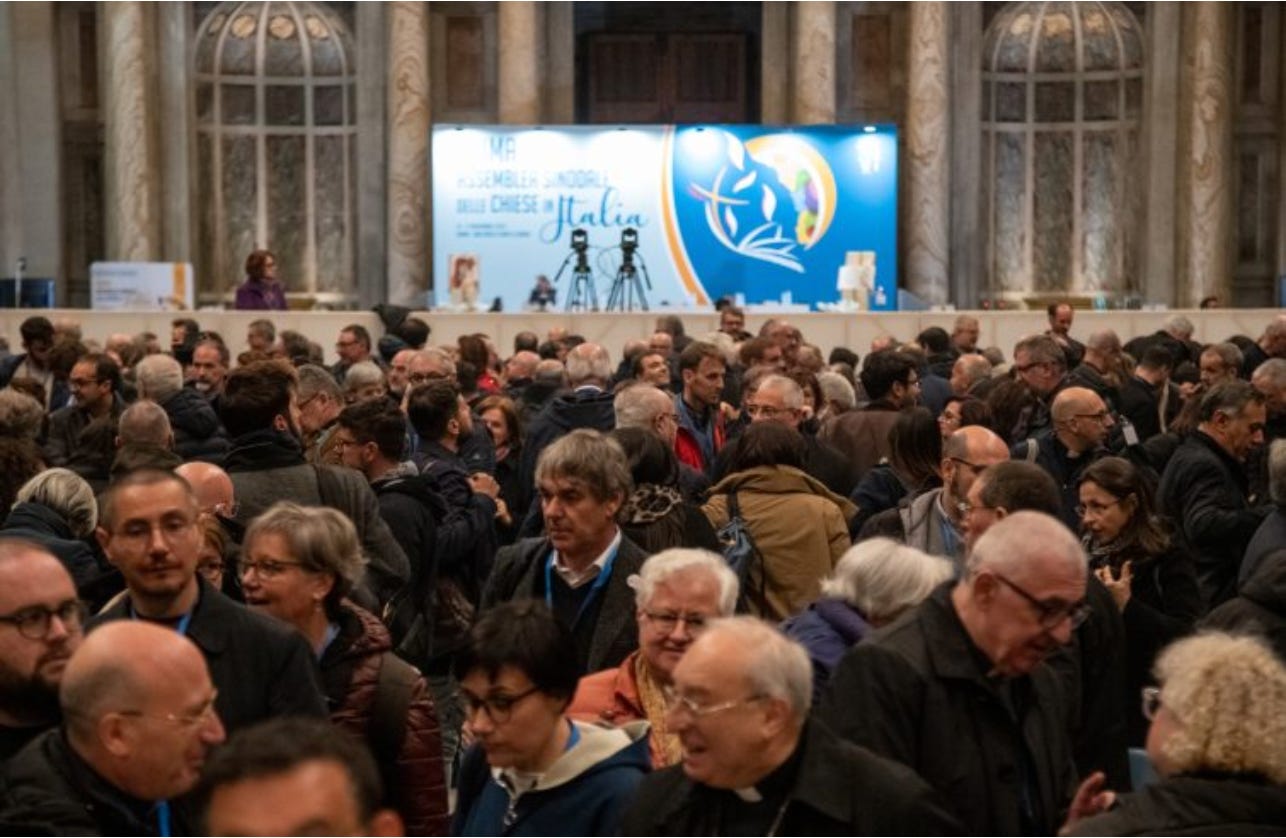Italian synodal assembly ends in stand-off over final document
“An appropriate amount of time is needed to mature [the text] and to respond to expectations.”

The second session of the Italian Synodal Assembly ended Thursday in a stand-off over a draft final document Thursday, leaving organizers to agree to drafting a new document to be voted on in October.
The assembly was expected to vote on a final document on April 3, but discontent grew among progressive members of the body, who argued that the text failed to properly address issues like pastoral care of LGBT persons, or to advocate for a female diaconate, and was not representative of the four-year synodal process.
After receiving too many amendment proposals to be considered before the scheduled vote, organizers decided instead to postpone consideration until October, giving them time to prepare a new document with the proposed amendments.
The assembly, convened by the Italian bishops’ conference, is composed of more than 1,00o participants — lay, clerical, and religious.
The Italian “synodal path” – as the bishops’ conference has called it – began in 2021, amid a global papal push to emphasize consultative “synodality” processes across the Church.
The final phase of the Italian synod started in May 2024 with the yearly bishops’ conference assembly. The organizers drafted a working document — called an Instrumentum laboris — in November and received contributions between January and February from all Italian dioceses and other Catholic institutions.
But Archbishop Erio Castellucci of Modena-Nonantola, main organizer of the Italian synodal path, said in a speech to the assembly that problems began after the organizers received the diocesan contributions.
“In the first days of [March] the presidency of the Synodal Path read all the contributions and some of the members drafted a first summary text, of 74,000 characters, read in full and discussed on March 11 in the Permanent Episcopal Council: In that meeting a drastic reduction of the document was requested, so that the form of synthetic and targeted propositions could be reached.”
The final draft document, published by the website Silere Non Possum on April 2, was a shorter text, as participants had requested. It emphasized synodality in the mission of the Church, the role of the laity in ministry and service of the Church, the need for transparency, the defense of human rights, and the importance of the pastoral and theological formation of the clergy, religious, and the laity.
But the reduction of the length and number of proposals made the document’s language too vague for some participants.
Local media reported that the document’s vote was postponed after a sizable number of assembly members threatened to vote against it, as they considered it insufficient in its treatment of topics including the pastoral care of people who identify as LGBT, the abuse crisis, and a female diaconate.
One participant told local newspaper La Repubblica that the final document did not address many of the proposals discussed during the four year process, saying that the assembly “met for four years, discussed, studied, exchanged ideas, made proposals, and none of this was found in the text” — including the possibility of ordaining women to the diaconate.
An unnamed bishop told Corriere della Sera that the document was a “poor text, drafted badly, because it was written in a hurry.”
According to the same outlet, some participants complained that expressions in the document such as “accompanying people in particular affective situations,” or the “ecclesial and pastoral responsibility of women,” were too vague.
Archbishop Castellucci told the assembly Thursday that the number of proposed amendments was so large that the final document had to be fully revised before bringing it to a vote, leading to its postponement.
A revised document will be brought to a vote on October 25, during the Jubilee of Synodal Teams and Participatory Bodies.
Castelluci conceded that the text “appeared inadequate, in fact. Therefore… the many amendment proposals put forward by the twenty-eight groups require a global rethinking of the text and not just the adjustment of some of its parts.”
He added that the document was “too synthetic” and that “the desire to listen to creativity prevails, going beyond the schemes that we have set ourselves.”
Castellucci also said that the document was drafted to an overly tight schedule since organizers originally expected a smaller number of amendment proposals.
The president of the Italian bishops’ conference, Cardinal Matteo Zuppi of Bologna, told participants that disagreements within the assembly were also an expression of synodality.
"This dynamism is good for us, it is the sign of a living Church… Let's continue to walk, how good it is for us to walk together,” said the cardinal.
Zuppi announced that the Italian bishops’ conference next plenary assembly would also be postponed, moving from May to November, to accommodate the change in the voting date on the synodal assembly’s final document.
This is the fourth time in its history the Italian bishops’ conference assembly has been postponed. The first time was in 2005, following the death of Pope St. John Paul II, and the two other delays came in 2020 and 2021 amid the Covid-19 pandemic.
In a press briefing after the end of the synodal assembly, Zuppi told journalists that “it seemed, considering the issues that have emerged, that more time is needed to reach decisions.”
“An appropriate amount of time is needed to mature [the text] and to respond to expectations,” said the cardinal.















